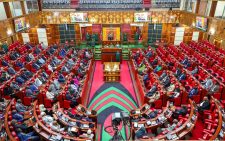2010 Constitution is not a ‘dumping site’

When Kenya gained independence in 1963, it adopted a carefully negotiated constitution—one that reflected the spirit of liberal democracy and included provisions on fundamental rights, separation of powers, and limited executive authority. But this framework was soon tested.
In the years that followed, Parliament—then acting more as an appendage of the Executive than as an oversight body—amended the Constitution repeatedly, not to enhance governance, but to concentrate power in the presidency, weaken institutions, and muzzle dissent.
By 1991, over 30 constitutional amendments had been enacted, each one slowly dismantling the independence bargain.
The abolition of the Senate in 1966, the shift from multipartyism to a de facto single-party state in 1969, and the removal of security of tenure for judges and public officers in the 1980s are just a few examples.
Kenya’s legislative history thus teaches us a painful lesson: law-making, when unchecked, can be used not to expand freedoms, but to stifle them.
Legislative activism
That same tendency is now creeping back—albeit in subtle, bureaucratic forms. From efforts to constitutionalise funds like the National Government Constituencies Development Fund (NG-CDF), National Government Affirmative Action Fund (NGAAF), and the proposed Senate Oversight Fund, to proposals like Esther Passaris’s amendment to the Public Order Act restricting public gatherings near national institutions, we are once again seeing a wave of legislative activism that is less about solving real problems.
These actions are more about protecting political interests.
Let’s be clear: Kenya does not lack laws. We have one of the most elaborate legal frameworks in Africa. The 2010 Constitution remains a landmark in participatory constitution-making, celebrated for its bold stance on devolution, public participation, integrity in leadership, and social justice.
From the Public Finance Management Act to the Access to Information Act, to the Leadership and Integrity Act, legal instruments exist to guide ethical conduct, ensure fiscal accountability, and uphold civil rights.
And yet, here we are—debating more legislation when the real crisis is failure to enforce the ones we already have.
Consider Chapter Six of the Constitution. It outlines the moral and ethical expectations for holders of public office.
But what happens in practice?
Politicians implicated in corruption continue to vie for office. Procurement scandals recycle with every election cycle. The Ethics and Anti-Corruption Commission (EACC)—tasked with enforcing Chapter Six—often appears neutered by political interference and resource constraints.
Take the Public Finance Management Act (PFMA). It provides a detailed framework for budgeting, expenditure control, and audit. Yet counties routinely overspend, misappropriate funds, or violate procurement laws with little consequence. Annual reports from the Auditor General reveal shocking abuses, but few cases result in convictions or firings. It’s not a question of legislative weakness—it’s a question of political will.
Dangerous path
What is annoying most is that, in the face of such systemic neglect, Parliament chooses to pursue more laws. The move to entrench NG-CDF, NGAAF, and Senate Oversight Fund into the Constitution is a classic example of legislative overreach. These funds already exist through statutes.
If courts have questioned their legality, the proper response is to align them with constitutional provisions, not to rewrite the Constitution to suit administrative convenience.
This is not just inefficient—it is dangerous. When we begin stuffing the Constitution with budget lines and project instruments, we reduce its status from a supreme law to a political wish list.
We risk eroding the values it was meant to protect: accountability, transparency, and the separation of powers.
Other democracies offer lessons in restraint. Norway and Finland, for instance, operate with lean legal frameworks, emphasising enforcement and institutional integrity over legal proliferation.
Global lessons
Singapore, often cited for its low levels of corruption, doesn’t have more laws than Kenya—it just applies them swiftly and without political bias.
Even Rwanda, closer to home despite its shortcomings in the democratic space, has demonstrated that institutional discipline and consistency, not legislative bulk, is the key to governance success.
The recent Public Order (Amendment) Bill, 2025, sponsored by Passaris, proposes to bar public gatherings within 100 meters of courts, Parliament and other “special government installations”.
It may appear reasonable on the surface, but beneath lies a chilling possibility: curtailing the right to peaceful assembly, guaranteed by Article 37 of the Constitution.
We’ve seen this playbook before—during the KANU era when demonstrations were criminalised, and criticism of the state was considered sedition. Do we really want to return there, one amendment at a time?
History shows us that bad laws are often passed under the pretext of order, just as good laws often fail due to political inertia.
Kenya doesn’t need new legislation every time a problem arises. It needs to: Audit what laws exist; evaluate their implementation; strengthen oversight institutions; improve civic legal literacy; and hold violators accountable—without fear or favour. In other words, the problem isn’t legal gaps—it’s legal hypocrisy.
Let us not repeat the errors of the past, where laws were passed not for justice, but for control. If the 2010 Constitution taught us anything, it is that Kenya’s future lies not in a flood of legislation, but in a renewed commitment to the law we already have.
That means funding our courts, protecting oversight bodies, empowering citizens, and above all, ensuring that no one is above the law.
So before Parliament drafts another bill or proposes another constitutional amendment, it must first answer one simple question: Have we done justice to the ones we already have?
The writer is a History lecturer & UASU Chapter Trustee, Alupe University-Kenya














